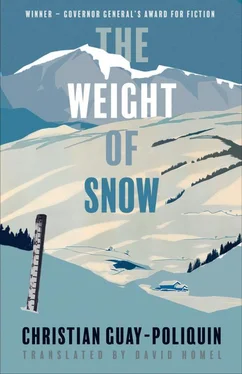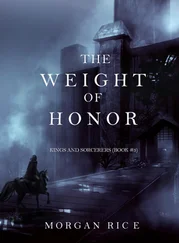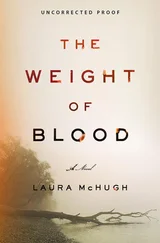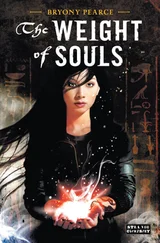By using a plank as a lever, I manage to lift part of the collapsed roof. Carefully, I crawl on my belly through the opening I have made. It is like a cave, an underground chamber spared by the snow. I move forward, feeling my way, and come upon my slingshot and, a little further on, my spyglass. I slip on some wet paper. It is the map Joseph gave me. I take hold of it, move out of the wreckage again, and go back to the living room.
The map is drying by the fire. It was damaged by water, but no information was lost. Over and over, with the tip of my index finger, I retrace the route that leads to my uncles’ hunting camp.
The fire burns down. I throw on a few more planks, and the flames illuminate the room again. I gaze at the objects I brought back, relics like the tin cans, and next to them the strips of bark on the floor. I pick up the note Matthias left. Three lines of black ink.
We survived the winter. I’ll never forget it. Now it’s time to leave. The next step can’t wait and you know it. Farewell.
I put the scrap of paper in my pocket and suddenly feel very alone. Matthias is right. Winter is finishing up. There’s nothing more to do here.
I can’t sleep at night. I think of Matthias journeying toward the city with his supplies and his gun. I think of Joseph and Maria, happy somewhere, far from the village. And my aunts and uncles watching the fast-flowing river and playing cards. I think of the ATV waiting for me in the shed.
I get up as soon as I spot the first glow of dawn through the window. I slip the spyglass, slingshot, Joseph’s map, and my meagre provisions into the pockets of my coat, then step outside, closing the door securely behind me.
The next step can’t wait. It’s true. It’s my turn to leave.
The sky is grey and smooth. Like a blanket draped over the landscape. The snow is heavy and sticky. With every step, I have to clean off my snowshoes with my poles to make any progress.
I reach the house by the lake. There are no fresh tracks. I am the only one who knows the secrets of this place. With one snowshoe I push aside the snow and ice from the shed doors. A padlock keeps the latch shut, but it is not locked. When I open the doors, the ATV is there, waiting under its tarp.
I sort through the piles of objects and tools in the shed and put everything useful in a box and strap it to the front of the ATV. A sleeping bag, a hammer, a short saw, a retractable knife, rope, and the tarp. All sorts of things. Among the treasures is an old pack of cigarettes. There are six left. I finish the job: I tie the gas cans on the back, on the luggage carrier, and I walk down to the lake with a cigarette in my mouth.
The ice is covered by a good layer of water. The lake is about to break up. Its surface is grey and featureless. Like the sky. I can’t tell where the lake begins and the shoreline ends.
I move a little closer and light my cigarette.
The mountains rise up around the lake and close one upon the other. I squint and make out a path that leads into the back country. A white line on a white background. That must be the way to go. There is always a lot of snow in the woods at the end of winter. If I bog down, I can use the ATV’s winch to get unstuck. Those machines are made to get through anything.
My cigarette is very good, and I smoke it down to the filter. I throw the butt toward the lake and turn around to head back to the shed. But when I move, the snow gives way beneath my feet and I’m up to my thighs in water. My boots and clothes are soaked in a matter of seconds. I try to get free, but I have nothing to hold onto, and the ice breaks when I put any weight on it. I finally manage to drag myself back onto the snow by stretching out full length. But once I start crawling, the surface opens up again and I fall back into the icy water. By the time I reach the shore, I am frozen stiff. It’s not easy finding my feet. My clothes weigh a tonne and I have lost my sense of direction. I have lost my coordination, too, and I have to concentrate to put one foot in front of the other. I stop in front of the shed. I am trembling, my teeth are chattering, and I am afraid I’m going to pass out with every breath. I need dry clothes. Now. Right now.
I move toward the house. My heart is pounding, but it is barely delivering any blood to my limbs. I throw myself against the door. It is locked. It looks like the downstairs windows have been boarded up from inside. The ones upstairs are out of reach. Cold is taking hold of me a little more firmly with each second. I can’t open and close my hands anymore.
I check the door and try to take a deep breath. Use my shoulder. My hip. My feet. The frame splinters, and the door finally gives way. I fall forward inside the house and pull off my clothes as fast as possible, struggling on the floor. The scars on my legs are deep blue. I run upstairs, shivering, open the first chest of drawers I see, and throw on all the clothes I can.
The socks, long johns, pants, wool sweater – they’re all a little small for me but that doesn’t matter. I sit on the edge of the bed and rub my legs for as long as I can.
When my limbs thaw out, I explore the room. I go to the closet in hopes of finding a pair of boots. When I open the door, my heart stops. Beneath the clothes on hangers is a shadow curled up on itself. It is motionless. I bend over. It is a woman. She is thin and old. Her white hair is shiny, her skin diaphanous, her eyes wide open. In a panic I exit the room and go down the stairs, making as little noise as possible, as if I had disturbed the repose of a very tired person.
Everything is impeccable in her kitchen. The floor is clean, the dishes are stacked in the cupboards, and an immaculate oil lamp stands proudly in the centre of the table. Home-made preserves are carefully lined up in the pantry along with baskets of garlic, onions, and potatoes. Only the cold and the dead plants on the windowsill betray the harmony of the room.
For a moment I wonder why I didn’t come here earlier. Matthias and I would have had something to eat, and the lady might have been freed from her loneliness.
In the vestibule I come upon a lumberjack shirt and rain boots. They will have to do. I pick supplies at random, gather up my wet clothes, and go out, trying to close the smashed-in door as best I can. Then, slowly, very slowly, I go back, regretting that I have to put off my departure. But as I walk away, I am not thinking so much of my aunts and uncles in their hunting camp but of the distress of the old woman in her closet.
When I make it back to the house at the end of the afternoon, the birds are pecking away at the rotten fish. I stop to watch them, then go into the living room. And here I thought I would never set foot in this place again. I try stoking the fire, but there is no more wood, and I don’t have the strength to attack the kitchen walls. Nor to go outside and gather wet branches.
At one spot in the room are the books we piled up when we burned the shelves. The books where Matthias poached his stories. I lean over and grab a few of them, the first ones I get to. I go back to the fireplace and, without hesitation, throw one onto the embers. The cover catches almost immediately. The corners roll up and the cardboard bends in the flames. The first pages bunch into each other. The book opens like an accordion. The heat is intense, but soon the book is no more than a shapeless, orange-and-black mass. Like a fragile, burning stone. I throw another book on, and the flames leap higher, spiralling up the chimney, and bright light fills the room. I take off all my clothes to enjoy the heat of the books and eat a few pickled beets from the old woman’s house. As I watch the pages burn, I wonder where Matthias might be about now. Further than I’ve gotten, that’s for sure.
Читать дальше











